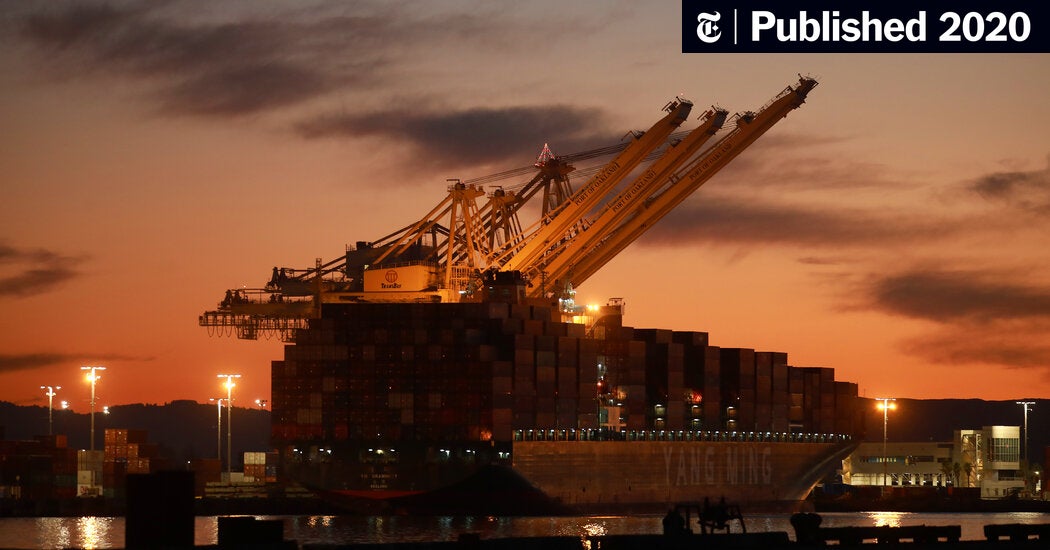Understanding China's Tariff Exemptions For US Businesses

Table of Contents
The Current State of US-China Trade Relations and Tariff Impacts
The US-China trade war, initiated in 2018, significantly impacted bilateral trade relations. Tariffs on imports, initially focused on specific sectors, broadened, leading to substantial trade sanctions and economic consequences for both countries. This period saw significant increases in tariffs on various goods, affecting numerous US businesses.
- Summary of major tariff increases and their effects: Multiple rounds of tariff increases, ranging from 10% to 25%, were imposed on hundreds of billions of dollars worth of goods. This led to increased costs for US importers, reduced competitiveness in the Chinese market, and impacted consumer prices.
- Specific sectors heavily impacted: Agriculture (soybeans, pork), technology (semiconductors, electronics), and manufacturing were among the sectors most significantly affected by the tariffs. These tariffs on imports created significant challenges for businesses relying on Chinese supply chains or exporting to China.
- Economic consequences for both countries: The trade war resulted in reduced trade volumes, increased uncertainty for businesses, and disruptions to global supply chains. Both the US and China experienced economic slowdowns and negative impacts on their respective industries. Understanding these impacts is crucial to navigating the current trade environment and seeking potential relief via tariff exemptions.
Eligibility Criteria for China's Tariff Exemptions
Securing China's tariff exemptions requires US businesses to meet specific eligibility requirements and conditions. The process is complex, demanding meticulous attention to detail and precise adherence to Chinese customs procedures. The availability and scope of exemptions also shift based on evolving trade policies, making continuous monitoring vital.
- Specific product categories eligible for exemptions: Eligibility isn't universal; it depends on the specific product, its origin, and the prevailing trade policies. Certain goods may be prioritized for exemption based on national needs or strategic agreements.
- Documentation needed for application: A comprehensive application demands thorough preparation. This typically involves providing proof of origin, import licenses, detailed product specifications, and other supporting documents as required by Chinese authorities. Any discrepancies can lead to delays or rejection.
- Deadlines and application processes: Strict deadlines govern the submission of applications. Missing deadlines can result in the loss of opportunity. Understanding and adhering to the outlined procedures is paramount.
- Government agencies involved in the approval process: The Chinese Ministry of Commerce (MOFCOM) and the General Administration of Customs (GAC) are key agencies involved in the review and approval process for tariff exemptions. Navigating these agencies requires a thorough understanding of their procedures and requirements.
The Application Process for Tariff Exemptions in China
Applying for tariff exemptions in China is a multi-step process that demands careful planning and execution. Each step requires precise adherence to guidelines, detailed documentation, and diligent follow-up.
- Detailed walkthrough of each step: The process usually involves initial application submission, review by relevant Chinese authorities, potential requests for further clarification or documentation, and final approval or rejection. Detailed instructions are usually available on the MOFCOM and GAC websites.
- Tips for preparing a strong application: A well-prepared application significantly increases the chances of success. This includes accurate and complete documentation, clear justification for the exemption request, and compliance with all relevant regulations.
- Potential challenges and how to overcome them: Challenges can include bureaucratic hurdles, lengthy processing times, and potential requests for additional information. Proactive communication and meticulous preparation can mitigate these challenges.
- Information on available support and resources: Various resources are available to assist businesses throughout the application process. These can include legal counsel specializing in international trade, customs brokers, and trade associations offering guidance.
Successfully Navigating the Chinese Customs System
Successfully obtaining China's tariff exemptions hinges on a deep understanding of Chinese customs regulations and procedures. This involves familiarity with import regulations, export regulations, and the intricacies of customs clearance.
- Key regulations related to tariff exemptions: Staying updated on relevant regulations is crucial, as they can change frequently. These regulations govern the documentation requirements, application procedures, and penalties for non-compliance.
- Potential penalties for non-compliance: Failure to comply with customs regulations can result in substantial fines, delays, and even rejection of the exemption application. Thorough understanding and adherence are vital to mitigate these risks.
- Strategies for minimizing delays and complications: Proactive communication, accurate documentation, and close monitoring of the application status can significantly reduce delays and complications. Engaging experienced customs brokers can also streamline the process.
- Importance of accurate documentation and record-keeping: Maintaining accurate records of all documentation submitted and communications with Chinese authorities is crucial for effective tracking and resolving any issues that may arise.
Seeking Professional Assistance for China Tariff Exemptions
Navigating the complexities of China's tariff exemptions can be overwhelming for businesses without specialized expertise. Engaging professionals like trade lawyers, customs brokers, or import consultants offers invaluable support.
- Expertise and experience of professionals in this area: These professionals possess in-depth knowledge of Chinese customs regulations, exemption processes, and effective strategies for maximizing the chances of success.
- The value of their knowledge in reducing risks and improving chances of success: Their expertise can significantly reduce risks associated with errors in documentation, missed deadlines, and misunderstandings of complex regulations.
- Cost considerations and return on investment: While engaging professional assistance comes with costs, the potential benefits—reduced risks, faster processing times, and improved chances of securing exemptions—often outweigh the expenses.
Conclusion
Successfully securing China's tariff exemptions requires careful planning and execution. Understanding the eligibility criteria, navigating the application process effectively, and adhering to Chinese customs regulations are crucial steps for US businesses seeking to minimize costs and maximize their trade opportunities with China. Understanding the complexities of the process is essential for navigating the evolving landscape of US-China trade relations. Learn more about navigating the complexities of China's tariff exemptions today!

Featured Posts
-
 Over The Counter Birth Control Increased Access And Its Implications
Apr 28, 2025
Over The Counter Birth Control Increased Access And Its Implications
Apr 28, 2025 -
 Abu Dhabi Pass 10 Gb Sim Card And 15 Discount On Attractions
Apr 28, 2025
Abu Dhabi Pass 10 Gb Sim Card And 15 Discount On Attractions
Apr 28, 2025 -
 Virginia Giuffre Dead Impact On Epstein And Prince Andrew Cases
Apr 28, 2025
Virginia Giuffre Dead Impact On Epstein And Prince Andrew Cases
Apr 28, 2025 -
 Red Sox Breakout Potential Identifying The Next Big Thing
Apr 28, 2025
Red Sox Breakout Potential Identifying The Next Big Thing
Apr 28, 2025 -
 Open Ais Chat Gpt Under Ftc Scrutiny Implications For Ai Development
Apr 28, 2025
Open Ais Chat Gpt Under Ftc Scrutiny Implications For Ai Development
Apr 28, 2025
